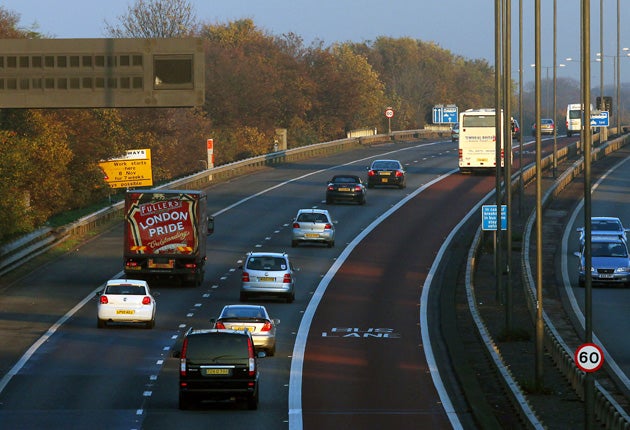End of the road for Britain's most hated traffic lane
Drivers will celebrate the demise of John Prescott's M4 bus lane. But, asks Andy McSmith, will we miss it when it's gone?

Your support helps us to tell the story
From reproductive rights to climate change to Big Tech, The Independent is on the ground when the story is developing. Whether it's investigating the financials of Elon Musk's pro-Trump PAC or producing our latest documentary, 'The A Word', which shines a light on the American women fighting for reproductive rights, we know how important it is to parse out the facts from the messaging.
At such a critical moment in US history, we need reporters on the ground. Your donation allows us to keep sending journalists to speak to both sides of the story.
The Independent is trusted by Americans across the entire political spectrum. And unlike many other quality news outlets, we choose not to lock Americans out of our reporting and analysis with paywalls. We believe quality journalism should be available to everyone, paid for by those who can afford it.
Your support makes all the difference.After causing more arguments that any stretch of road of comparable length anywhere in the country, the much unloved M4 bus lane is no more. The 3.5 miles of motorway, which for the past 11 years has been reserved for buses, coaches, taxis, cycles and emergency vehicles only, is being returned to usage by all vehicles.
The Highways Agency has already started changing the road signs, and normal traffic is expected to be filling the hated lane by the end of the week. Its disappearance will lower the blood pressure of motorists who in the past have found themselves stuck in nose-to-tail traffic on the two lanes open for general use, while buses and taxis sailed past in the outside lane.
But the rules governing the bus lane have only been "suspended" until June 2012, when there will be special arrangements to make sure athletes competing in the Olympics are not trapped in London traffic. After that, the Government insists that the bus lane will be permanently abolished.
One of the most irritating aspects of the privileged strip of asphalt was that if you were stuck in a queue long enough, you were sure to see someone drive past who was not supposed to be using it. The penalty was a £60 fine for anyone who was caught – but the chances of detection were low.
There were no fixed cameras along the route and police appeared to regard the apprehending of unauthorised users as a luxury rather than a priority. Research by BBC London last year revealed that there were just 14 fixed penalty notices issued during the whole of 2008. One taxi firm's proprietor instructed his drivers to use the bus lane on every journey from Heathrow airport into London, calculating that any fines they were unlucky enough to pick up would be worth the time saved. There were also occasions when fuming motorists noticed a cavalcade of private cars with police outriders flashing by in the bus lane, bringing Tony Blair and his advisers home from official trips overseas.
John Prescott, when he was the Secretary of State for the Environment and Transport, opened the bus lane in 1999 to speed up the journeys of air travellers trying to get from Heathrow into London.
It was one of many actions taken by the Labour government to encourage people to leave their cars at home and travel on public transport. Labour believed that discouraging car use would be good for the environment, but the Conservatives call that attitude "the war on motorists".
"Scrapping the M4 bus lane is symbolic of this Government's decision to end the war on the motorist," the Transport Secretary, Philip Hammond, said yesterday. "It ends the injustice suffered by thousands of drivers who sit in traffic next to an empty lane day in, day out."
But not everyone is pleased to see the bus lane disappear. Taxi drivers now face being stuck in the same queues as other motorists, while their exasperated passengers sit and watch the meter tick away. "We estimate that almost 4,000 black cabs use that lane every day, coming into town, so it's a disappointment for us," Bob Oddy, the general secretary of the Licensed Taxi Drivers' Association, said. "It was an advantage for our passengers to be using the bus lane rather than being stuck."
Join our commenting forum
Join thought-provoking conversations, follow other Independent readers and see their replies
0Comments